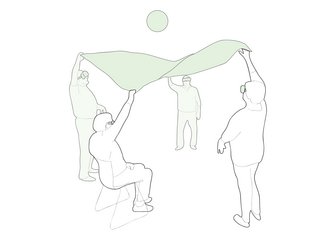
»GROOVE« Explores Connecting in Virtual Spaces
All over Germany, you can find friends living far away from one another, couples in long-distance relationships and grandparents living far away from their grandchildren. While spending time together in video conferences is a possibility, this form of shared experience has its limits. Social Virtual Reality provides extended potential for these interactions. But how can interactions that foster social intimacy be further improved in virtual spaces? This question is the focal point of the »GROOVE« research project. Together with researchers from the Technischen Universität Ilmenau, Brandenburg Labs GmbH and Consensive GmbH, researchers from the Bauhaus-Universität Weimar will be receiving 1.5 million euros in funding over 1.5 years from the German Federal Ministry of Education and Research (BMBF).
The number of people using social Virtual Reality continues to increase: Individuals meet in virtual worlds and sing, dance or play games together. Social Virtual Reality makes interpersonal interaction possible, even across large distances. Until now, however, VR systems have not been able to support precise temporal synchronization. Participants’ actions are not experienced simultaneously and activities fall out of sync.
»GROOVE« joint project researchers are aiming to make synchronized social interaction in virtual reality possible. The project looks at improving the perceived synchronicity of virtual social interactions through both technical and cognitive psychological factors. The researchers want to test, for example, whether external stimuli, light stimuli, and acoustic or haptic stimuli on people’s bodies can help synchronisation in digital spaces or improve the experience of a synchronized interaction.
The research project began on 1 April 2023 and involves a number of university departments, as well as companies from Weimar and Ilmenau to combine targeted skill sets and allow an interdisciplinary approach. Participating from the Computer Science of Media Department at the Bauhaus-Universität Weimar include Human-Computer Interaction (Prof. Dr. Eva Hornecker, project coordinator), Virtual Reality and Visualisation (Prof. Dr. Bernd Fröhlich), and the Usability Research Group (Prof. Dr. Jan Ehlers). Technischen Universität Ilmenau participants include the Media Psychology and Media Design Group in the Institute of Media and Communication Science. Brandenburg Labs GmbH and the Weimarer Startup Consensive GmbH will also be contributing their expertise.
About the »Nähe über Distanz - Mit interaktiven Technologien zwischenmenschliche Verbundenheit ermöglichen« funding programme:
The goal of the German Federal Ministry of Education and Research (BMBF) funding programme is to establish new concepts for products and services based on innovative interactive technologies that strengthen bonds between people across large distances. By using new, technology-based forms of interaction, maintaining meaningful social relationships is made easier, therefore increasing individual resilience and improving quality of life.
Additional information on the German Federal Ministry of Education and Research (BMBF) funding programme can be found at: https://www.interaktive-technologien.de/foerderung/bekanntmachungen/naedi
For questions on the research project, please contact project coordinator. Prof. Dr. Eva Hornecker, Department of Human-Computer Interaction, by phone (+49 (0) 36 43/58 38 87) or e-mail (eva.hornecker[at]uni-weimar.de).
Kontakt
Bauhaus-Universität Weimar
Claudia Weinreich
Pressesprecherin
Tel.: +49(0)3643/58 11 73
Luise Ziegler
Mitarbeiterin Medienarbeit
Tel.: +49(0)3643/58 11 80
Fax: +49(0)3643/58 11 72
E-Mail: presse[at]uni-weimar.de
Web: www.uni-weimar.de/medienservice
